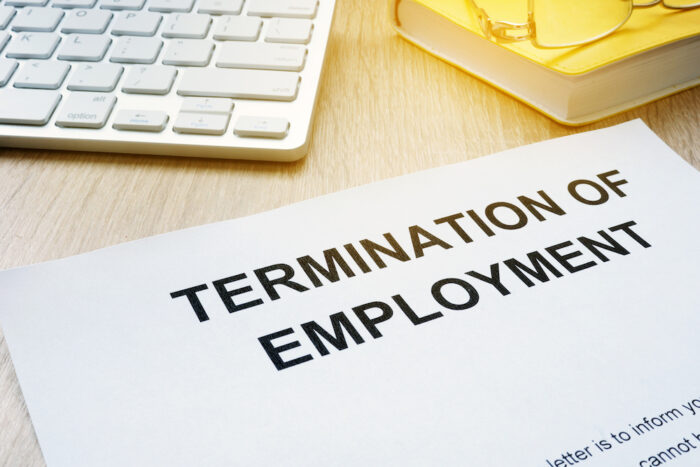A rough guide to dismissing employees
A golf club may find it necessary to consider the dismissal of an employee. This factsheet from the National Golf Clubs Advisory Association (NGCAA) sets out the broad legal position and procedure to be aware of and follow when making or considering such a dismissal. Please note, however, that there is a lot more to consider and that more information is available on our website and by contacting NGCAA direct for advice by email or telephone. Indeed, it is strongly recommended that clubs take advice in relation to their particular situation before commencing any dismissal procedure.
- The unfair dismissal right
Employees have the right not to be unfairly dismissed. To avoid an unfair dismissal, care must be taken to dismiss only with a fair reason and after following a full and fair procedure. Employees who believe that they have been unfairly dismissed may bring a claim in the Employment Tribunal.
- Qualifying Period
To be eligible to do so, employees will usually need to have worked for a qualifying period. The qualifying period is two years’ continuous employment as at the “Effective Date of Termination” for employees who started on or after 6 April 2012 (a one-year qualifying period applied to anyone whose period of continuous employment started before that date). The Effective Date of Termination is:
- the date on which the employee’s notice expires (where the employee has been terminated with notice);
- the date on which termination takes effect (where the employee has been dismissed without notice); or
- if the employee is employed under a limited-term contract which terminates without being renewed under the same contract, the date on which the termination takes effect.
However, beware that there is no length of service requirement in relation to most ‘automatically unfair grounds‘ for dismissal (as set out below).

A dismissal will be ‘automatically unfair’ and no qualifying period applies if the reason for it is connected with the following main exemptions:
- Family reasons – connected with pregnancy, childbirth, or statutory maternity, paternity, adoption, parental leave, shared parental leave or time off for dependants.
- Health and safety reasons.
- Whistleblowing – Unfair dismissal for making a protected disclosure.
- Statutory rights – Unfair dismissal for asserting certain statutory rights.
- Time off for training – Unfair dismissal in connection with time off for study and training request rights.
- Jury service – Unfair dismissal in connection with carrying out jury service.
- Representation – Unfair dismissal for performing functions as an employee representative on a TUPE transfer or collective redundancy.
- Flexible working requests – Unfair dismissal in connection with an application for flexible working.
- Trade union grounds – Unfair dismissal in connection with trade union recognition or for trade union membership or non-membership, or participation in trade union activities.
- Part-time and fixed-term employees – Unfair dismissal related to status as a part-time or fixed term worker.
- Agency workers – Unfair dismissal in connection with exercising prescribed rights as an agency worker.
- Zero hours contracts – Unfair dismissal in connection with the breach of an exclusivity term in a zero hours contract.
- Pay and working hours – Unfair dismissal for a reason connected with rights under the Working Time Regulations 1998 and related to the National Minimum Wage.
There are a small number of dismissals which will be ‘automatically unfair’ but which still require a qualifying period of two years’ service, including dismissal because of a spent conviction or some dismissals relating to a TUPE transfer.
- Who can claim?
Only employees have the right not to be unfairly dismissed. It is not possible for workers who are not employees, or the genuinely self-employed, to claim unfair dismissal. It is important to therefore consider and correctly identify the employment status of an individual before terminating their employment. Workers (such as agency or zero hour workers) can sometimes be employees in law, with the benefit of the additional rights of an employee, such as the right not to be unfairly dismissed and, if they worked for a club for long enough, they may have continuity of service to make complaints before the Employment Tribunal.
In particular, the club should take care with agency workers who have worked for a club for more than a short time, or who have moved from temporary to permanent contracts. Also take care with casual or zero hour workers after a period of regular work or where the reality of the relationship between the club and worker is in fact that of employer and employee.
Employment status is a complex area and so advice should be taken from the NGCAA if there is any doubt about a person’s status.
- Considerations when dismissing employees
A dismissal will be fair if a club can show that it is for one of the following reasons:
- a reason related to an employee’s conduct (misconduct);
- a reason related to an employee’s capability or qualifications for the job (capability/performance);
- because of a redundancy;
- because a statutory duty or restriction prohibited the employment being continued (statutory ban); or
- some other substantial reason of a kind which justifies the dismissal (SOSR); and
that the club acted reasonably in treating that reason as sufficient for dismissal, considering all the circumstances (including the employer’s size and administrative resources).
In general, in order to act reasonably, an employer must follow a fair procedure when dismissing an employee. In relation to misconduct and performance dismissals, this includes following the ACAS Code on Disciplinary and Grievance Procedures (ACAS Code), which explicitly applies to disciplinary situations including misconduct and poor performance dismissals. The ACAS Code excludes from its application dismissals on the grounds of redundancy or the non-renewal of a fixed term contract. Where relevant, it must be taken into account by Employment Tribunals in deciding whether an employer has acted reasonably in relation to the procedure followed. Further, an unreasonable failure to follow the Code (by either party) may result in compensation being increased or decreased by up to 25 percent.

Although the details of the procedure to be followed will depend on the reason why the club is considering dismissal, there are some principles of procedural fairness that would apply to most cases. The employee should know that they are at risk of dismissal, and why, and should be allowed to make representations (usually at a meeting or hearing), and they should also be allowed a right of appeal.
It is incredibly important that a club follows the dismissal procedure appropriate to the reason for dismissal. For example, a long-term ill health dismissal would follow a consultation process and the obtaining of medical reports, consideration of reasonable adjustments and possible disability-related matters. A redundancy dismissal will require a detailed consultation process as well. For further advice on the appropriate procedure, please contact the NGCAA for advice.
Golf clubs should also be aware of the possibility of discrimination claims: issues under the Equality Act 2010 can crop up at any time during the employment relationship (including recruitment and sometimes post-dismissal). This remains the case during any dismissal procedure, so extra caution should be exercised, as well as advice taken from NGCAA if there is even the slightest possibility of discrimination.
If a club decides to dismiss an employee they must not only follow the correct procedure, but also give proper notice of termination of employment (except in certain circumstances such as when dismissing on the grounds of gross misconduct). Failure to give the correct notice period may amount to a breach of contract in respect of which employees may make a claim of “Wrongful Dismissal” to the Employment Tribunal, claiming their notice pay. It is best practice to give written notice of dismissal stating the Effective Date of Termination of employment.
- Constructive dismissal
Being suddenly demoted for no reason.Sometimes an employee may resign with immediate effect and make a complaint in the Employment Tribunal that they have been constructively dismissed. Constructive dismissal is when an employee feels forced to resign because of actions of their employer that amount to a fundamental breach of the employment contract, such that the employee feels that they cannot continue to work for the employer. Situations that could lead an employee to feeling they have been constructively dismissed could include:
- Being bullied or discriminated against by either the employer or colleagues.
- Changing hours or place of work without agreement and without the contractual right to do so.
- Raising a grievance which the employer refuses to look into.
- Being given an excessive workload.
- Consistently being paid incorrectly.
Generally speaking, an employee would need to resign promptly and directly as a result of an alleged fundamental breach of their contract in order to be successful with a constructive dismissal claim. This can be a complex area so for further advice, please contact the NGCAA.

- Record keeping
It is recommended that a full contemporaneous record of any dismissal procedure and decision be made and kept by a club. This should include copies of letters, notes of meetings, calls and conversations, copies of all documentary evidence relied upon and those relevant to the individual’s employment such as their contract of employment and any other relevant records. Such documents will be required to defend any claim and will be disclosable to the employee in those proceedings.
For more detail on employment law matters, or any other legal matter affecting your golf club, please contact Alistair Smith at the NGCAA on 01886 812 943 or office@ngcaa.co.uk















Let me tell You a sad story ! There are no comments yet, but You can be first one to comment this article.
Write a comment